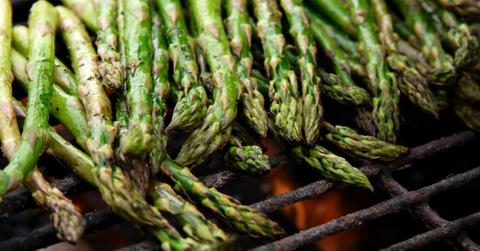Why Does Asparagus Make Pee Smell?
Updated Aug. 6 2020, 2:50 p.m. ET

Some of life’s bigger questions are just too overwhelming to contemplate. Things like the best way to stop climate change and how to live eco-friendlier are big questions with complex answers. So, if you’re looking for something a little easier to grasp, at least for right now, we can get to the bottom of what asparagus does to our bodies — particularly, to our urine.
Thanks to science, we can settle on a relatively concrete answer about why eating asparagus alters the smell of our pee. If you’ve been wondering why this happens when you eat asparagus, Green Matters consulted a few experts to answer the enigma once and for all.
Why does asparagus make your pee smell?
Asparagus is a tasty (depending on your taste buds!) green, spring vegetable classified as a perennial flowering plant. As with most green veggies, asparagus is a healthy food, providing ample vitamin K, vitamin B9 (folate), and vitamins A, C, and E, phosphorus, potassium, and protein, according to The Spruce Eats. But aside from all those nutrients, there’s one major thing about eating asparagus that people tend to notice: The way it alters the smell of your pee.
“Asparagusic acid tends to be the source of the foul-smelling urine, a substance strong in sulfur and found in asparagus,” Dr. Vikram Tarugu, a gastroenterologist and CEO of Detox of South Florida tells Green Matters. “This produces volatile components that are accountable for the unpleasant scent of asparagus urine as the body digests asparagus and breaks down asparagusic acid. Within 15 to 30 minutes of eating asparagus, this odor can develop.”
So, basically, it’s nothing you did. It’s the asparagus, not you.
“Asparagusic acid is broken down in the body into a sulfur-containing compound called methanethiol,” explains Leann Poston, M.D., M.B.A., M.Ed. at Invigor Medical. “You will recognize the sulfur smell from such things as garlic, boiled cabbage, and skunk spray.”
According to Poston, onions are guilty of such a smell, too; in fact, that’s why we tend to tear up when cutting onions.
“You may notice that when you cut an onion, the smell travels up to your nose and if you cut it under running water, it’s not as bad,” Poston says. “That is because sulfur chemicals are volatile, meaning they float through the air. When asparagus is converted to sulfur chemical, and then excreted in urine, the volatile sulfur chemical is easily noticed.”
Why does asparagus only make some peoples’ pee smell?

Not everyone reports being able to detect the change in their urine’s smell.
In fact, according to Dr. Taragu, “Ironically, not all asparagus eaters are influenced similarly by asparagus. Studies suggest that after consuming asparagus, 22 to 50 percent of people report experiencing odd smells of urine. So, what about the other 50 to 78 percent of the population? Why don’t they smell anything after eating asparagus?”
Well, researchers are not entirely sure why that is, but there are theories. Is it because asparagus only changes some peoples’ urine or is it because not everyone can physically smell the scent?
“This [has] led to two theories — that not everyone metabolizes asparagus in the same way and some people lack the ability to smell the sulfur gases produced from asparagus,” Poston adds. “The inability to smell something is called anosmia. There are olfactory (smell) receptors in the top of the nose into which chemical molecules fit and stimulate nerves that send signals to the brain.”
These signals are then interpreted as a scent, Poston says, adding, “It is genetically determined which receptors and how many of each you have. This is why some people notice odors better than others. Genetics company 23 and Me asked people if they smell the sulfur compounds in urine after eating asparagus and then compared the genetic sequences to those who said yes to those who said no. They found an area on chromosome 1 that contains 39 genes for olfactory receptors. A mutation in one of these genes seems to determine if you can smell the sulfur compounds in urine or not. There are likely hundreds of variations of the genes that control smell that ultimately determine whether you can smell methanethiol or not.”
While genetics is one mainstream theory, Dr. Giuseppe Aragona, M.D., General Practitioner and Family Doctor at Prescription Doctor, says there could be multiple explanations.
“Some people can digest asparagus better than others, which explains the change in the smell or the intensity, depending on the person,” Dr. Aragona explains. “Some people can smell it better down to genetics. Some people have stronger senses than others, or their best sense is different to someone else’s.”
Dr. Aragona reasons that some senses simply might be stronger than others, also because of genetics.
“A common occurrence of this is sight and hearing, but it can also affect smell, taste, and touch, too,” Dr. Aragona says. “We see that some people don’t have much sensation in taste, and this is down to genetics, believe it or not. So overall, your urine will probably smell when you eat asparagus, but [it’s] no need to worry.”
Is smelling asparagus urine a genetic thing?

Maybe. The research done by 23 and Me is pretty compelling, but Dr. Taragu adds that genetics is one of the main theories, but another reason could be peoples’ individual digestive systems.
“Researchers have brought up two intriguing theories. First, that the digestive systems of some people can break down asparagusic acid to release the sulfur compound. The majority of us don’t have the aerobic ability to generate pungent urine from asparagus.” And the second theory? “Nasal receptors connected with DNA coding, which recognize the different compounds produced by asparagus urine, occur only in certain individuals. And this hypothesis says that after consuming asparagus, all humans generate smelly urine, so only few individuals can detect it.”
Of course, enough individuals can smell it that people are Googling it, so if you can smell the change in your urine after eating asparagus, welcome to the club!
Will we ever get a 100 percent, definite answer?
Eh. Right now, these two lines of thought — that it’s either genetics or our digestive systems — seem to be enough of a concrete answer. After all, as Dr. Taragu points out, there is a lot more important research to be done in other areas.
“Unfortunately, asparagus urine research isn’t at the top of scientists’ priority list, so we may wait a while to figure out if [these] hypotheses are valid.”
Touché.